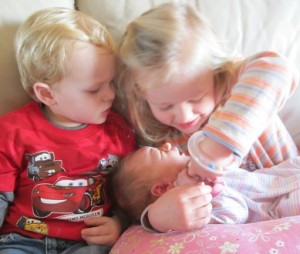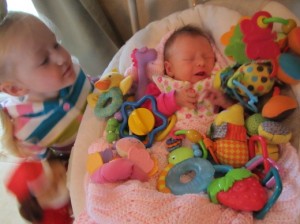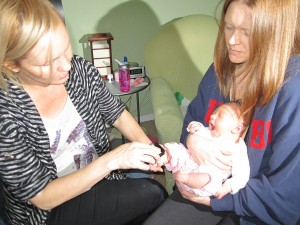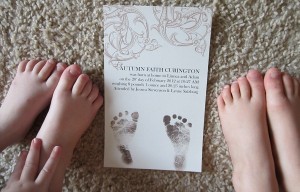Family-friendly expert James Dobson says that when a new baby arrives, the youngsters already in the home have an interesting perspective. What they see and hear is the equivalent of daddy telling mommy, “Honey, I’ve got good news. I’m bringing home another wife to join our family. She’ll be just as important as you are, and I’ll love her just as much as I love you. She’ll be part of every family gathering and will sleep with us, too. We’ll have to treat her with extra kindness until she gets comfortable being here. You’ll just love her.”
Understanding this perspective, which is common in older siblings, gives us a clear picture of what’s just ahead for my daughter and son-in-law, who introduced a new baby one week ago. At the moment, everything is sunshine and light. Skylar, age 3, and Micah, 2, are still in a period of adjustment we used to call “the honeymoon stage” with the new baby still in the category of a new toy. “Can I hold the baby, Mommy?” is still being answered with, “Sure,” and cameras are still recording each episode. We’re praising their gentleness and finding it easy to continue the introductory litany:
“What a sweet big sister you are, Skylar. You’ll be a wonderful teacher for Autumn. She can’t do this… that… or the other… and you can.”
“Baby has no teeth, Micah. Do you have teeth? Wow! You can chew strawberries and beans, but baby can’t. What a big boy you are!”
Linnea and Adam know all about what’s upcoming and how to handle it, but that doesn’t make it easy. I’ve been impressed with their parenting and know they’ll persist in not allowing children #1 and #2 to occupy center-stage the way they’ll both want to.
Scripture gives a good deal of parental advice on this very point, stressing the importance of not permitting children to rule the roost. But it isn’t just a problem with kids. We adults like to occupy center-stage once in a while too, wanting increased attention from a husband, a parent, a friend or even God. We hate to wait our turn and often have difficulty sharing. We especially struggle with this when God is the one insisting on it:
“Why can’t I have positive answers to my prayers and have them immediately? And why do I have to serve in this… that… or the other capacity once again? Why can’t someone else do it this time?”
But when we begin thinking like this, we start sliding backwards spiritually. Living the Christian life is all about surrendering. Our calendars, the hours of our days, our energy and, much to our dismay, center-stage. But just as Skylar and Micah have to adjust to baby Autumn, the rest of us have to adjust to God’s way of doing things, especially if we want peace in the family.
“Be transformed by the renewal of your mind.” (Romans 12:2a)





